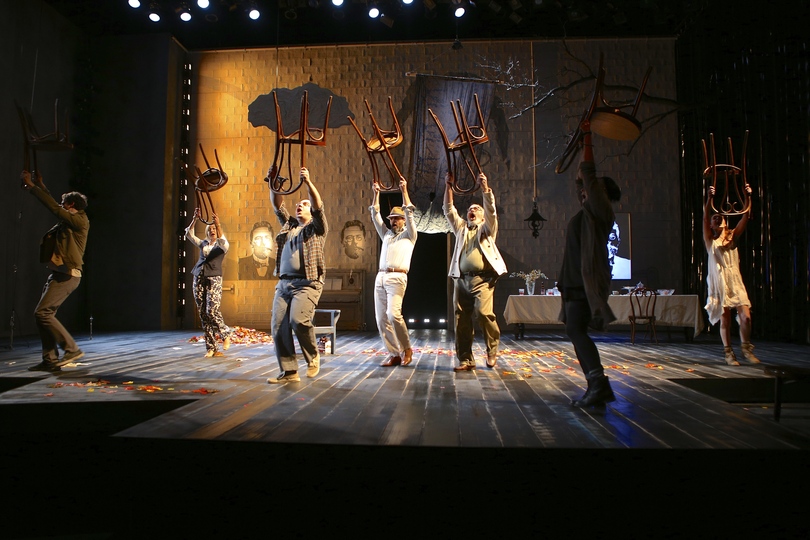‘Stupid F***ing Bird’ breaks the fourth wall in a dark, self-deprecating comedy

The seven-person cast of "Stupid F***ing Bird" dances to Russian music during the play's opening night on Friday at the Syracuse Stage/SU Drama Complex. Courtesy of Syracuse Stage
All it took was the first line of Syracuse Stage’s “Stupid F***ing Bird” for audience members to realize it’s not a normal production.
“The play will begin when someone says, ‘Start the f***ing play,’” says Ian Holcomb, who plays the role of Conrad. He stares directly into the audience, inviting them to respond, and smiles when the people yell the words right back to him.
Breaking the fourth wall, in which characters acknowledge the presence of the audience and that they are in a fictional play, happens throughout “Stupid F***ing Bird,” a play that calls itself a “sort of adaptation” from the Russian drama “The Seagull” by Anton Chekhov. The production, which comes to Syracuse Stage from the Woolly Mammoth Theatre in Washington, D.C., had its opening night on Friday at the Syracuse Stage/SU Drama Complex.
The play at first glance seems like it has no clear plot line, and some might argue that it doesn’t. With an ensemble cast of seven complex characters, “Stupid F***ing Bird” explores the themes of art, theatre and love, but also touches on topics of suicide and existential crises. There’s a great deal of swearing, actors running up and down the aisles, random dancing to Russian music and even a brief moment of nudity.
Holcomb’s character is Conrad, a theatre artist and playwright who is madly in love with his girlfriend, Nina, an aspiring actress. His mother Emma is a successful actress who is dating Doyle Trigorin, a famous writer. Dev, who is a tutor, is Conrad’s best friend and is madly in love with Mash, a cook. And then there’s Eugene, Emma’s older brother and Conrad’s uncle, who seems to serve as both the group’s moral compass and unofficial therapist.
The self-aware — or more accurately, self-deprecating — mood of the production shares similar plot points, names and love triangles from Chekhov’s “The Seagull.” Dev loves Mash, who loves Conrad, who loves Nina, who ends up falling for Trigorin. At one point Conrad, played by Holcomb, even acknowledges who Chekhov is and yells “F*ck you” to the Russian dramatist, whose face was plastered on a large scale several times across the backdrop.
“One of my favorite parts of what I get to do is I get to interact with the audience so much and invite them to be a part of the show,” Holcomb said after the show. “It’s surprising because I first expected some discomfort with it, but audiences have loved it, especially tonight — they really jumped in.”
There’s a scene where Conrad asks his friend Dev how he can win back the love of his girlfriend, who is falling for someone else. To the audience’s surprise, Holcomb turns to them and asks, “How can I win her back?”
Two brief seconds of awkward silence passed before people began yelling responses such as “write her a song,” “blueberry muffins,” “money,” make her jealous” and “Viagra.”
“Be less pretentious!” one guy yelled.
Holcomb looks straight at him and says, “I’m memorizing your face for later.”
While moments like these ensure that “Stupid F***ing Bird” will make audiences laugh, the play has its share of dark moments, which are also loosely based on Chekhov’s work. The first act ends after Conrad goes offstage and a gunshot is heard, with the other six characters rushing to him.
The tone from the first act to the second immediately shifts, and the audience realizes this is more than just a humorous play. When the second act begins, the mood has changed and the laughs and cheers that result are not from self-deprecating lines but from cleverly spoken truths.
Darius Pierce, who plays the role of Dev, said one of the reasons “Stupid F***ing Bird” stands out as a play is because it “feels very new.”
“There’s a lot of elements of it that feels like I haven’t seen in theatre before, but that’s on top of a really universal, charming, heartfelt story,” Pierce said. “I don’t think you could get away with some of the things we do onstage if there wasn’t that layer hidden underneath.”
The play ends the same way it began, with one line abruptly spoken to the audience.
“Stop the f***ing play.”




